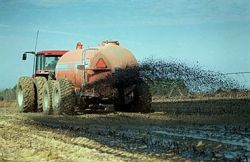Halifax Media Co-op
News from Nova Scotia's Grassroots
Spreading It Thick
Based on a Literature Review-Focused Study, HRM Council Votes to Lift Moratorium on Biosolids.
On October 26th, Halifax Regional Municipality Council voted 17-5 to lift the 1 year moratorium on applying biosolids to municipal lands. The moratorium was put in place after residents on Dunbreck Road complained of a sickness-inducing smell emanating from a recent application of biosolids onto municipal lands in their neighbourhood. A third-party study, upon whose findings council's vote was based, found that the smell was not actually from the biosolids, and was from something else, perhaps compost, that had been mixed into the biosolids soil treatment.
The findings of the report, in that the biosolids that HRM is legally-bound to purchase from private company N-Viro are not smelly, is not necessarily satisfactory, however. Granted, they may not smell, but many were hoping that the third-party study would undertake some scientific research into the actual chemical composition of what constitutes a bag of N-Viro's biosolids, trademarked as "N-Viro Soil." The amount tendered for the contract between the HRM and third-party Hydromantis Environmental Software Solutions, was for over $200,000, certainly enough to conduct a rigorous scientific test of the potentially toxic materials that we are now going to see being spread thick over HRM lands.
Instead, Hydromantis did a literature review. Their literature review certainly does note that N-Viro Soil is a certified fertilizer, but also notes that N-Viro Soil may contain concentrations of medications, and all manner of "Emerging Substances of Concern", including flame retardants, musks, shampoos, and all the other crap we unthinkingly flush down the drain.
We knew this before Hydromantis didn't do any scientific research though, when we were all $200,000 richer. Independent groups have been sounding the alarm bell over biosolids for years. We knew this and that was why we were hopeful, obviously naively so, that at least a scientifically-rigorous study would provide some real, third party, evidence as to what was in N-Viro Soil.
Instead, we have a study that acknowledges that N-Viro Soil, no matter how it is treated, no matter how much cement dust is added to it, will still contain pathogens, such as Salmonella. The findings of the study note that if it is properly applied to soil however, these pathogens shouldn't really come back. But we knew this too.
And this is not particularly reassuring, as last spring photos of massive piles of N-Viro Soil, sitting on snowbanks, began to surface from Colchester County, Nova Scotia. These were not examples of proper soil application (which involve thinly spreading N-Viro Soil onto existing topsoil), and should have in fact brought N-Viro into a breach of it's contract. However, without any monitoring policy in place, there seems to be no recourse but to blindly trust Hydromantis' literature review, as did HRM council.
Finally, the Hydromantis report recommends a wide-scale education campaign, to combat the negative perception that biosolids currently have. This includes a recommendation for education campaigns at local schools. Dare I ask if there is a mascot in the works?
But what was truly to be expected? The HRM is knee-deep into a legally-binding contract with N-Viro, the details of which are not readily provided by city or Halifax Water spokespeople. The N-Viro plant in Aerotech Park cost $12 million, and the N-Viro website itself notes that it is in the midst of a $330 million contract with the HRM. In a classic example of "fox guarding the henhouse", the Hydromantis study itself cites data gathered by N-Viro. What else would this data possibly say than "It is safe"? There's too much money invested to say much else at this point.
Please enjoy the following audio with Dr. David Lewis. Dr. Lewis worked as a microbiologist with the Environmental Protection Agency (EPA), and was very much involved with Sludge Rule 503, the regulation that is the "go-to" in relation to the supposed safety of biosolids soil application. He blew the whistle on biosolids, and was subsequently frozen out of the EPA. Dr. Lewis' current work can be found at www.whistleblowers.org. It also bears mentioning that the Hydromantis report spends several paragraphs in attempting to discredit Dr. Lewis' findings on the dangers of biosolids.
The site for the Halifax local of The Media Co-op has been archived and will no longer be updated. Please visit the main Media Co-op website to learn more about the organization.



